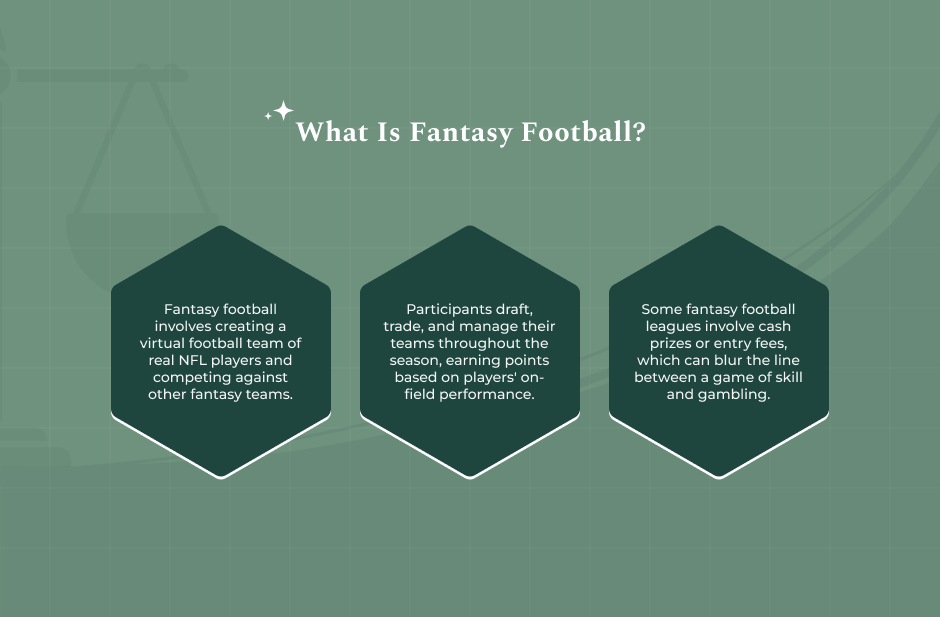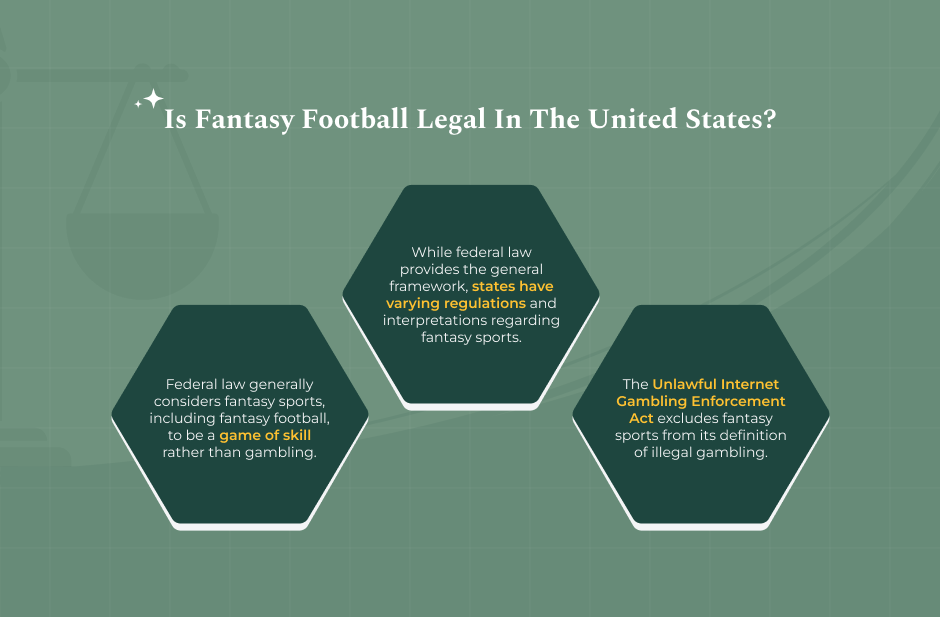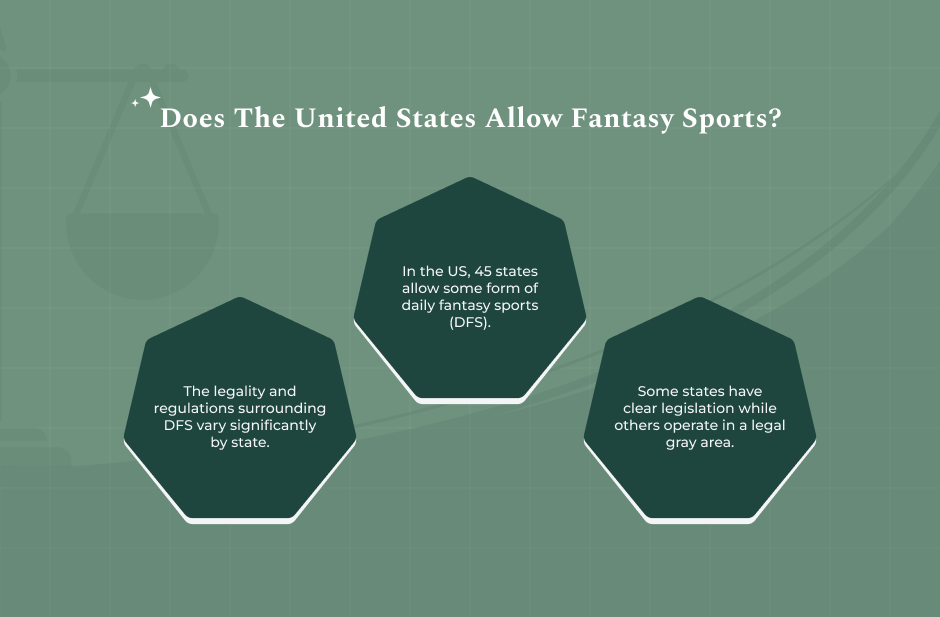It’s 2025, and Fantasy Football isn’t just some weekend hobby anymore—it’s become this huge world full of excitement, strategy, and bragging rights.
Every season, tons of people join fantasy leagues where they “draft” real NFL players to create their dream teams.
Then they rack up points based on how well those players actually perform on the field. It’s kind of like being a mini team manager, without the stress of press conferences or angry fans.
But here’s the thing—once you throw money into the mix, it’s no longer just a game. Suddenly, you’ve got winners, losers, rules, and yep… legal stuff to think about.
Some states call it gambling, some don’t. Some websites are squeaky clean with regulations, others, not so much. That’s why it has become so very important for us to understand the legality of Fantasy Football!
And, if that’s what you want to know, you have come to the right place. Therefore, keep reading till the end…
Understanding Fantasy Football And How It Works

Before I start talking about the legality of Fantasy Football, it is important to understand what it is, really. Let me try to give you a hypothetical situation!
Let’s say that you’re the coach of a team, but instead of managing the Dallas Cowboys or whatever, you’re handpicking your own squad of real NFL players.
This lineup? That’s your fantasy team. The selection process is called a fantasy football draft. It’s kind of like picking teams in P.E. class, only digital—and a lot more intense.
Here’s the usual drill:
- You join a league with buddies or even strangers online.
- Everyone takes turns choosing NFL players (yep, that’s the draft).
- Each week, your players earn points based on their actual performance.
- At the end of the season, whoever racks up the most points? Boom. Winner.
Sometimes you’re playing for bragging rights. Other times, it’s serious business with cash prizes on the line.
Now, there are two main flavors of fantasy football:
- Season-Long Leagues: Same team, whole season. Classic style.
- Daily Fantasy Sports (DFS): New team every day or week—usually on apps like DraftKings or FanDuel.
So… why does the law care?
Well, when you’re tossing money into the pot—whether it’s an entry fee or a prize—it starts to look a bit like gambling. And that’s a whole different ballgame, legally speaking.
Legality Of Fantasy Football: Is Gambling Legal In The States?

Here’s where things get murky. Gambling laws in the U.S. are kind of a patchwork—they vary wildly from one state to the next. What flies in New Jersey might get you into hot water in Idaho.
The big question: Is fantasy football considered gambling?
Short answer? It depends.
There’s a federal law—the Unlawful Internet Gambling Enforcement Act (UIGEA) from 2006—that gives fantasy sports a pass if they follow certain rules. Mainly, the law says it’s not gambling if the outcome is based more on skill than luck.
So, since fantasy football involves research, strategy, and a little bit of football know-how, it usually falls into the “skill” category. Not a total gamble like roulette or scratch-off tickets.
But here’s the catch—states still get to make their own rules.
Let’s break it down:
| Type of Game | Is It Legal? |
| Game of Skill (Fantasy) | Usually yes |
| Game of Chance (Betting) | Often banned or restricted |
Still, even a skill-based game can raise legal red flags if there’s money involved. That’s why it’s super important to check your local laws before jumping into a paid league.
What Are The Requirements To Be Legally Compliant In Fantasy Football?
Well, just for instance, let’s say you’re either running or joining a football fantasy league. How can you ensure that you are not violating any laws—especially if the money is involved as a prize?
Something that makes your fantasy football set up legally safe is:
- It is primarily a game of skill.
- The winners are determined by factual sports statistics.
- The payment of the fee and receiving the prize are absolutely clear.
- You’re not placing a bet on the actual NFL games.
In case you are the one who is in charge of running, or you are setting up the league, here are some points that might help you:
- Tell the truth about the point system.
- Inform everyone that this is not a deceitful way of gambling on the NFL games.
- Gather the prize money and distribute it properly.
- Use only trustworthy platforms such as ESPN, Yahoo, or DraftKings—they’re the ones that follow the rules.
Just to add on, some of the apps have the age restrictions, which are normally 18+, and not all platforms run in every state. Sometimes, they block letter users from some locations where the laws are strict.
Also, remember: Your best friend’s cousin may have an idea of a $50 buy-in league, but it does not necessarily mean it is legal in your state. It is always vital to check.
Which States Allow Fantasy Sports?

Here’s some good news: Most states do allow some form of fantasy sports.
But (and this is a big but), not all of them are on board with daily fantasy sports (DFS) or money-based leagues.
Let me help you with a quick look:
| Allowed | Restricted / Banned |
| California, Florida, Texas | Washington, Idaho, Hawaii, Nevada |
| New York, Illinois, Ohio | Montana, Arizona (limited DFS only) |
A few things to keep in mind:
- DFS is more closely monitored than season-long leagues.
- Some states allow free-to-play, but not cash-based contests.
- Laws change—a lot. Just because it’s okay now doesn’t mean it’ll stay that way.
Here’s a pro tip: Check the Terms of Service on your fantasy app. They’ll usually list where their games are allowed.
And whatever you do—don’t try to cheat the system if your state bans fantasy contests. It’s not worth the risk.
Not sure where your state stands? Stick to free leagues or keep the prizes non-monetary.
Your Legal Guide: How Does The Legality Of Fantasy Football Influence The Gambling Laws?
If you have read the blog till here, you must have already understood one thing! Fantasy football is kind of like the “middle child” in the gambling family—it’s not quite a game of chance, but it’s not purely for fun either.
Here’s where it lands legally: somewhere in the gray zone between gaming and gambling.
Normal gambling laws focus on stuff like:
- Casinos.
- Sports betting.
- Lotteries.
- Poker nights.
Fantasy football gets a pass because it’s seen as a game of skill. And that tiny detail? It’s been a huge deal legally.
Fantasy leagues have actually nudged lawmakers to:
- Redefine “skill vs. chance” in clearer ways.
- Write specific laws for fantasy sports.
- Push for age checks and geo-blocking on fantasy platforms.
- Make apps like FanDuel work directly with state regulators.
In fact, in some places, fantasy football even helped open the door to legalized sports betting. It proved that people could play online and handle it responsibly.
But if you start blending real betting with fantasy leagues—like using it as a front to wager on actual NFL outcomes—you’re crossing a line into illegal gambling territory.
Read Also:
















